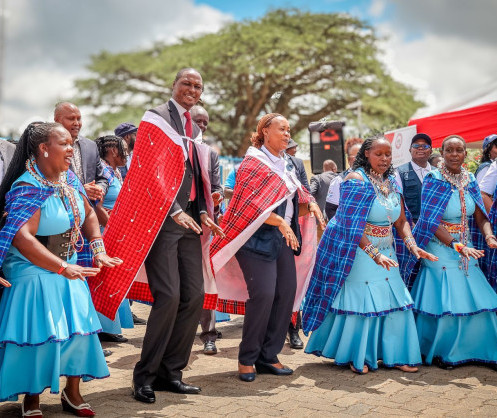The theme for this year is “Healthy Beginnings, Hopeful Futures”, focusing on efforts to end preventable maternal and newborn deaths and prioritizing women’s long term health and wellbeing.
On April 7, 2025, WHO Kenya joined hands with the Ministry of Health, Kajiado County leaders, health partners, and community members to mark World Health Day. The theme for this year is “Healthy Beginnings, Hopeful Futures”, focusing on efforts to end preventable maternal and newborn deaths and prioritizing women’s long term health and wellbeing.
The event was led by Kajiado’s Deputy Governor, Hon. Martin Moshisho Martine, who commended the strong partnership with WHO Kenya. In his remarks Deputy Governor, Martine highlighted the significant improvements the county has made in reproductive and maternal health. The county has increased service delivery points from 100 (in 2018) to 134 in 2025, resulting in the increase of immunization coverage for under one years from 78% to 95%. The skilled deliveries in a safe environment improved from 64% in 2018 to 83% in 2024. There was also an increase of enrolment for the Social Health Insurance, all of which have brought service closer to the mothers.
“We are proud of the progress made and ready to do even more,” he said.
Ms. Patricia Wamala, speaking on behalf of WHO Representative Dr. Abdourahmane Diallo, reminded everyone that “Investing in maternal and newborn health is not a cost—it’s an investment in a healthier, more prosperous future.” She emphasized that the well-being of mothers and newborns is the foundation of healthy societies. “Let’s close the care gap and ensure every birth is safe and supported.”
Dr. Luigi D’Acquino, Chief of Health for UNICEF Kenya, also underscored his organization’s commitment to the cause: “UNICEF stands with WHO and the Ministry of Health to ensure every child’s right to life is upheld. This year-long campaign on maternal and newborn health aligns with our core mission: protecting children’s rights from the very beginning,” he said.
As part of the event, WHO Kenya donated 50 Mama Kits and 50 Dignity Kits to enhance the facility’s capacity to provide quality maternal and newborn services. Mama Kits contain essential items for mothers and newborns, while Dignity Kits support the hygiene needs of women and girls with items such as sanitary pads, soap, and personal care supplies. WHO Kenya staff also participated in cleaning the maternal and child health unit at the hospital, and interacted with mothers, health care workers and community members to listen and learn from their experiences.
This World Health Day was not only a celebration – but also served as a moment to reflect on progress and reaffirm collective efforts toward building a healthier future for all.







OTHER ARTICLES
Editorial — Prevent, inform, and act for women’s health in Africa
Kenya : Government Prioritises Maternal Health and Strengthens Support for Community Health Promoters
Strengthening pandemic prevention, preparedness, and response capacities in Senegal using the “One Health” approach